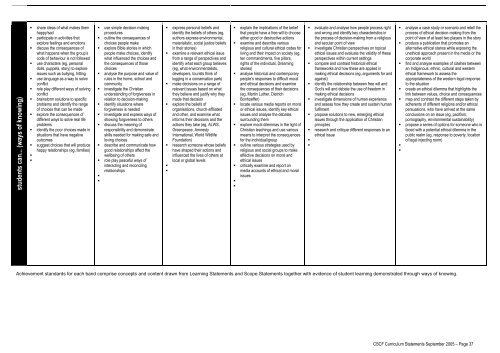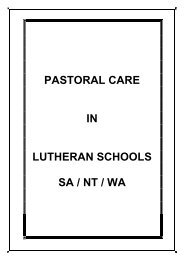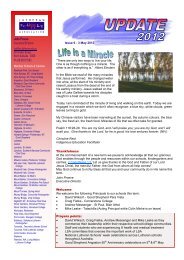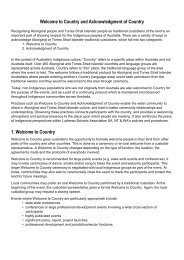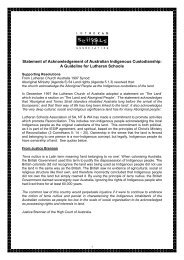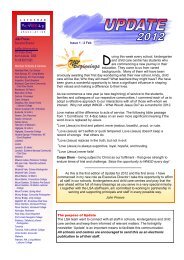students know... (knowledge and elaborations)scope statementslearningstatementCHRISTIANITY IN THE WORLDKey Idea 3: People make decisions using a range of religious perspectives and ethical frameworksBeginning Band A Band B Band C Band D Band ECW 1.3Children make connections betweentheir actions and consequences forthemselves and othersCW 2.3Students explore and outline waysChristians make decisions about howto liveCW 3.3Students describe the connectionsbetween what Christians believe andthe decisions they makeCW 4.3Students apply decision-makingprocesses to ethical issues and explainhow and why people hold different ethicalpositionsCW 5.3Students analyse and compare perspectives ofdifferent ethical and religious frameworks oncontemporary ethical issuesCW 6.3Students evaluate and apply theoretical ethicalframeworks to complex competing claims of real-lifesituationsChristians believe God created people with thefreedom to choose how they will live. Thisinvolves thinking about, choosing and decidingon the most positive course of action. Thereare wrong and right choices which haveconsequences for individual people and thecommunities in which they live. This applies toall of areas of life.Ethical decisions are made within the context ofcommunity. The choices individuals makeaffect their relationships. Christians are guidedby biblical principles for living using Jesus’ lifeas a demonstration of how to apply thoseprinciples to relationships and community life.Christians can ask for God’s forgiveness whenthey make wrong choices and for strength to dowhat is right and good.Beliefs about the nature of God, people andthe environment influence the decisions andchoices Christians make regarding theirtreatment of others and the world in which theylive. People can behave similarly for differentreasons. Christian values embrace God’s viewof life and how it is lived. This is not limited towhat is legal or acceptable to society.Ethical decisions are complex and difficult. Wisedecisions distinguish between a right and wrongcourse of action to resolve a problem. Knowledge ofcause and effect and analysis of differentapproaches, beliefs about life and right and wronginfluence decision-making. Christians depend onGod and his word to decide on a course of action.A range of ethical frameworks have developed over time,reflecting what different people believe about what makes a goodlife and what it means to be human. Each framework provides aprocess of reasoning for decision-making which can assistpeople to understand new ethical problems arising from achanging world context. A Christian worldview embraces biblicalperspectives on how one lives an ethical life.An ethical life applies a consistent set of principles to all areas ofpersonal and communal life. Individual rights, freedom of choiceand responsibility to others must be held in balance. Newrevelations can bring into question existing solutions to ethicalissues. Personal action is subject to continual review andevaluation. Firm beliefs and commitment to thoughtful action areimportant. Christians’ faith in God provides direction in theirdecision-making.God creates people with the ability tomake choicesDecisions have positive or negativeresultsThere are always different ways tosolve a problemPeople make choices in a variety ofsituationsDifferent choices have differentconsequencesConsequences can affect self andothers and the environmentIt is important for people to beresponsible for their actions becausethey can impact on othersResponsible decision-making• God gives humans the freedomto choose• people make different choicesand there is not always one rightdecision• people who follow Jesus refer tothe Bible to help them make achoice• what Christians believe isimportant in making decisions• Christians pray for guidance,strength and wisdom whenmaking decisions and trust Godto help them• making responsible decisionshelps to foster positiverelationships with others• people can ask themselvesquestions to make a better choiceConsequences of choices• there are positive and negativeconsequences for decisionspeople make• people who follow Jesus knowthey can say sorry for their wrongchoices and know God will forgivethemBeliefs and decision-making• people have different beliefs andthis impacts on their decisions(eg, human rights, environmentalbeliefs, religious beliefs)• people believe different things forvarious reasons (eg impact offamily, peers, religion,experience)• people make decisions based onfact, experience and what theybelieve• difference between fact andopinionBiblical perspectives affectingdecision-making• creation is good and for thewellbeing of all people• all people are created in theimage of God• the ten commandments• Luke 12:31, Matt 6:25–34; 7:7,8• the law of love• God’s love and forgiveness for allpeople• actions arising from selfishnessand greed bring unhealthyoutcomes such as conflict,damage to the environment,breakdown of community lifeChristian frameworks for decision-making(eg, use of the Bible, law of love)Decision-making processes• gathering information about aproblem• identifying and analysing issuessurrounding an ethical situation• brainstorming ways of approaching adifficult decision• researching solutions• exploring and anticipatingimplications of approaches toresolving a problem• deciding on and justifying a course ofaction• analysis and evaluation of solutionsMoral and ethical Issues• people attempt to answer difficultquestions based on their beliefs,information and feelings• people face moral issues (eg, peerpressure, adolescent tensions)• ethical dilemmas (eg, bioethics,sexual relations)• the consequences of decision-makingDifferent perspectivesPeople use a range of frameworks toattempt to answer difficult questions• cultural frameworks (eg, humanism,greatest good, Indigenous)• personal frameworks (eg, based onindividual’s personal experience)Ethical frameworks• historical development of ethical frameworks(eg, utilitarianism, individualism, natural law,situation ethics)• teachings on right and wrong behaviour (eg,moral, immoral, amoral)• definitions of happiness and dimensions ofhuman experience (intellectual, aesthetic,moral, spiritual, physical, emotional, social) andapplication to decision-makingChristian perspectives• connecting God’s will and the freedom of choicegiven to humans• applying Christian code of conduct to everydaydecision-making situationsOther religious perspectives• Buddhist• Hindu• Moslem• JewishExploration of contemporary ethical issues• social matters related to the beginning and endof life• political• economic• environmental• scientific (eg, bioethics)•Nature of ethics• the difference between ethics and morality• the complexity of ethical decision-making• the steps of ethical decision-making• conflict between private and public ethics (eg,does legal equal ethical?)• equally valid yet competing claims• ethical high ground versus practical reality (eg,genetically modified food may pose a long-termhealth risk yet may also feed starving people)An ethical life from a Christian perspective• natural law• situation ethics (Fletcher)• ethics of Jesus• law and gospel (as an ethical principle)• ethics of vocation and work• ethics and the law• ethics of marriage and family• Christian liberty (human freedom andresponsibility)Eastern ethical systems (eg, Taoist, Buddhist,Confucian)Contemporary ethicists<strong>CSCF</strong> <strong>Curriculum</strong> <strong>Statements</strong> September 2005 – Page 36
students can... (ways of knowing)• share ideas of what makes themhappy/sad• participate in activities thatexplore feelings and emotions• discuss the consequences ofwhat happens when the group’scode of behaviour is not followed• use characters (eg, personaldolls, puppets, story) to exploreissues such as bullying, hitting• use language as a way to solveconflict• role play different ways of solvingconflict• brainstorm solutions to specificproblems and identify the rangeof choices that can be made• explore the consequences ofdifferent ways to solve real lifeproblems• identify the poor choices made insituations that have negativeoutcomes• suggest choices that will producehappy relationships (eg, families)••• use simple decision-makingprocedures• outline the consequences ofchoices people make• explore Bible stories in whichpeople make choices, identifywhat influenced the choices andthe consequences of thosechoices• analyse the purpose and value ofrules in the home, school andcommunity• investigate the Christianunderstanding of forgiveness inrelation to decision-making• identify situations whereforgiveness is needed• investigate and express ways ofshowing forgiveness to others• discuss the meaning ofresponsibility and demonstrateskills needed for making safe andloving choices• describe and communicate howgood relationships affect thewellbeing of others• role play peaceful ways ofinteracting and reconcilingrelationships••• express personal beliefs andidentify the beliefs of others (eg,authors express environmental,materialistic, social justice beliefsin their stories)• examine a relevant ethical issuefrom a range of perspectives andidentify what each group believes(eg, what environmentalists,developers, tourists think oflogging in a conservation park)• make decisions on a range ofrelevant issues based on whatthey believe and justify why theymade that decision• explore the beliefs oforganisations, church-affiliatedand other, and examine whatinforms their decisions and theactions they take (eg, ALWS,Greenpeace, AmnestyInternational, World WildlifeFoundation)• research someone whose beliefshave shaped their actions andinfluenced the lives of others atlocal or global levels••• explain the implications of the beliefthat people have a free will to chooseeither good or destructive actions• examine and describe variousreligious and cultural ethical codes forliving and their impact on society (eg,ten commandments, five pillars,rights of the individual, Dreamingstories)• analyse historical and contemporarypeople’s responses to difficult moraland ethical decisions and examinethe consequences of their decisions(eg, Martin Luther, DietrichBonhoeffer)• locate various media reports on moralor ethical issues, identify key ethicalissues and analyse the debatessurrounding them• explore moral dilemmas in the light ofChristian teachings and use variousmeans to interpret the consequencesfor the individual/group• outline various strategies used byreligious and social groups to makeeffective decisions on moral andethical issues• critically examine and report onmedia accounts of ethical and moralissues••• evaluate and analyse how people process rightand wrong and identify key characteristics inthe process of decision-making from a religiousand secular point of view• investigate Christian perspectives on topicalethical issues and evaluate the validity of theseperspectives within current settings• compare and contrast historical ethicalframeworks and how these are applied inmaking ethical decisions (eg, arguments for andagainst)• identify the relationship between free will andGod’s will and debate the use of freedom inmaking ethical decisions• investigate dimensions of human experienceand assess how they create and sustain humanfulfilment• propose solutions to new, emerging ethicalissues through the application of Christianprinciples• research and critique different responses to anethical issue••• analyse a case study or scenario and retell theprocess of ethical decision-making from thepoint of view of at least two players in the story• produce a publication that promotes analternative ethical stance while exposing theunethical approach present in the media or thecorporate world• find and analyse examples of clashes betweenan Indigenous, ethnic, cultural and westernethical framework to assess theappropriateness of the western legal responseto the situation• create an ethical dilemma that highlights thelink between values, choice and consequences• map and contrast the different steps taken byadherents of different religions and/or ethicalpersuasions, who have arrived at the sameconclusions on an issue (eg, pacifism,pornography, environmental sustainability)• propose a series of options for someone who isfaced with a potential ethical dilemma in thepublic realm (eg, response to poverty, locationof legal injecting room)••Achievement standards for each band comprise concepts and content drawn from Learning <strong>Statements</strong> and Scope <strong>Statements</strong> together with evidence of student learning demonstrated through ways of knowing.<strong>CSCF</strong> <strong>Curriculum</strong> <strong>Statements</strong> September 2005 – Page 37


